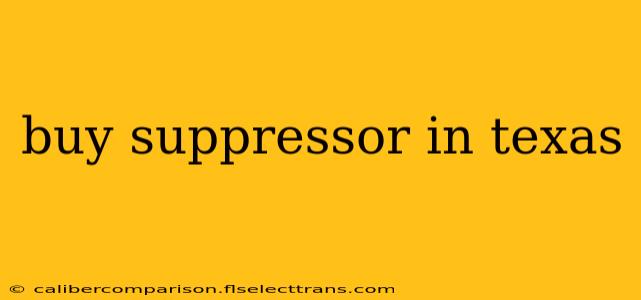Purchasing a suppressor in Texas involves navigating a complex web of federal and state regulations. This guide breaks down the process, clarifying the legal requirements and steps involved in acquiring a suppressor legally and safely in the Lone Star State.
Understanding Federal Regulations: The NFA's Impact
Before diving into Texas-specific laws, it's crucial to understand the federal regulations governing suppressors. The National Firearms Act (NFA) of 1934 classifies suppressors as National Firearms Act (NFA) items, subjecting them to strict regulations. This means you'll need to navigate a process that includes:
- Bureau of Alcohol, Tobacco, Firearms and Explosives (ATF) Form 4: This is the primary application form required for purchasing a suppressor. It requires detailed personal information, fingerprints, photographs, and a thorough background check.
- $200 Tax Stamp: A significant tax is levied on each suppressor purchase, contributing to the overall cost.
- Waiting Period: Expect a substantial waiting period for ATF approval, which can often extend several months.
Texas Suppressor Laws: State-Specific Considerations
Texas law largely aligns with federal regulations, but there are some key state-specific points to keep in mind:
- No State-Level Restrictions: Texas does not impose additional restrictions on suppressor ownership beyond those mandated at the federal level. This means there are no specific state permits or licensing requirements beyond what's needed to comply with federal NFA regulations.
- Compliance with Federal Law is Paramount: While Texas doesn't add extra layers of regulation, ensuring complete compliance with federal NFA rules is absolutely essential to avoid legal repercussions.
- Concealed Carry and Suppressors: The legality of carrying a suppressed firearm while concealed depends on compliance with all federal and state laws related to concealed handgun licensing.
The Step-by-Step Process of Buying a Suppressor in Texas
-
Choose a Licensed Dealer: Find a licensed dealer who specializes in NFA items. They will guide you through the process and handle the necessary paperwork.
-
Complete ATF Form 4: The dealer will assist you in completing the ATF Form 4 accurately and completely. Any errors can significantly delay the process.
-
Fingerprinting and Photography: You'll need to provide fingerprints and photographs as part of the application. Your dealer can often facilitate this process.
-
Background Check: A comprehensive background check is conducted by the ATF. This is a crucial step, and any disqualifying factors will prevent approval.
-
Payment of Tax Stamp: The $200 tax stamp must be paid as part of the application process.
-
ATF Approval: Once your application is processed and approved, you'll receive the necessary paperwork allowing you to take possession of your suppressor. This is where the significant waiting period comes into play.
Understanding the Costs Involved
The cost of a suppressor in Texas isn't limited to just the purchase price. You need to factor in:
- Suppressor Price: This varies depending on the manufacturer, model, and caliber.
- ATF Tax Stamp: The mandatory $200 tax.
- Dealer Fees: Dealers charge fees for their services in processing the paperwork.
Responsible Suppressor Ownership in Texas
Owning a suppressor carries responsibilities. Always adhere to all applicable laws and regulations, both federal and state. Safe handling and storage are paramount to ensure safety and prevent accidents.
Disclaimer: This information is for general guidance only and does not constitute legal advice. Always consult with a qualified legal professional and your chosen dealer to ensure you understand and comply with all applicable laws and regulations before purchasing a suppressor. This information is current as of [Date of Publication], but laws can change. Always verify the latest regulations before proceeding.

